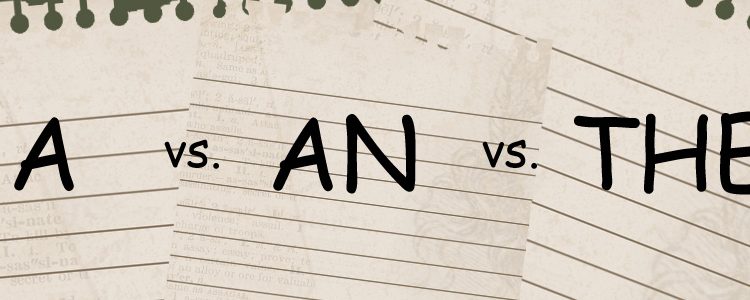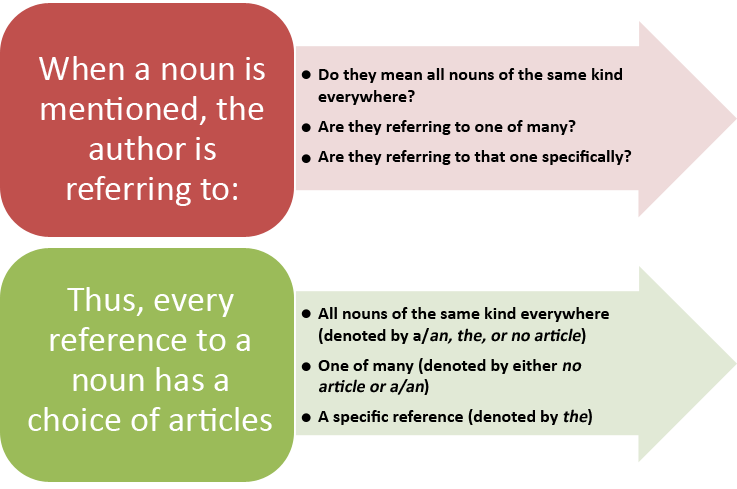How to Use Articles in Academic Writing

Articles function as limiting adjectives that help us understand which person, place, thing, or concept is being discussed. Despite their simplistic rules, articles and commas are the most difficult to tackle for non-native English speakers. Article usage can be quite idiosyncratic in academic writing, and when writing manuscripts, one has to be particularly aware of the context of usage. In this post, we shall systematically categorize article usage in academic writing.
Native usage of articles develops over time as a result of extensive reading, observation, contextual understanding, and, of course, participation in conversation. However, in most cases, the proper article to be used can be determined by asking a few simple questions.

Hence, the first step is to determine whether the noun is a proper noun (definite article or no article) or common noun (indefinite articles). Next, in case of a common noun, it is important to determine whether the reference is generic or specific. Generic references would mean that a noun represents all examples without mentioning a specific category (e.g., policies vs. economic policies).Specific references would include introducing a common noun in a text (with an indefinite article or no articles) and using the definite article in consequent references. Article usage may then vary with the context.
Related: Need help with language and grammar for securing a $500,000 research grant? Check out this section today!
Use of the Definite Article
Proper Noun
1. The United Nations, founded in 1945, is currently made up of 193 Member States.
2. Tumor resection with cardiopulmonary bypass (CPB) is still disputable in the field of oncology.
Contextual (specific) Reference
The method introduced in H1 yielded the same results as the other method used in H2. (where the method has already been introduced; thus, it is a noun that has already been defined and can be referred to using the definite article)
Use of Indefinite Articles
If the noun that is being defined/modified is one of many (i.e., an example or a single member of a group), indefinite articles such as “a” or “an” should be used:
Human Genome Project was an exciting development towards personalized medicine.
Article Usage with Countable and Non-count Nouns
1. If a noun is being used as a representative of every instance or individual, its singular form can be used along with the definite article.
The smartphone has become an inalienable part of modern existence.
Alternatively, the plural form can also be used for a generic reference. However, the definite article must be omitted in this case.
Smartphones have become an inalienable part of modern existence.
2. In English, mass nouns are ones that cannot be counted and usually lack a plural in general usage.
Wisdom is not a product of schooling but of the lifelong attempt to acquire it. (Albert Einstein)
Note!
- No article is used when a plural noun is introduced in the text (first mention). However, the definite article can be used to refer to that specific noun from the second mention onwards for clarity.
- Articles are usually omitted in titles and headlines to save space and boost impact.
References:
The Learning Centre (2016, August) Article Usage and Count and Non-count Nouns. Retrieved from http://www.vaniercollege.qc.ca/tlc/files/2016/08/Article-Usage-Count-Non-Count-Nouns.pdf
Articles. Retrieved from https://www.grammarly.com/blog/articles/
The Writing Center at UNC-Chapel Hill. Articles. Retrieved from http://writingcenter.unc.edu/handouts/articles/
David Appleyard. David Appleyard’s Guide to Article Usage in English. Retrieved from https://davidappleyard.com/english/index.html






Students often write or create academic writing for their project, assignment or thesis for their school. Academic writing is one of the methods that we students are crucial in making mistakes. We don’t usually notice even a small flaw on our paper. This article titled, How to use articles in academic writing, explains how we must apply specific words on our writing. We must determine what we are aiming to do on our paper for us to know how to write it. Articles helps us what concept we are discussing in our paper that is why it has to be organized, systematic, brief and most especially free from mistakes. It was explained here that your article can be defined as proper noun or common noun. Definite article or proper noun presents a specific article. It uses proper nouns to present the articles. While Indefinite article uses common nouns. Under it are countable and non-count nouns. Countable nouns are used as a representative of every instance or individual, its singular form can be used along with the definite article. While non-count words are mass nouns are ones that cannot be counted and usually lack a plural in general usage. As you can see if we students almost write every day and don’t know anything about this topic then we will fail not just as writers but also as students because we failed to present our writing in a correct way. Always remember this topic and apply this to your everyday life either you’re a writer or not
Thanks for the nice explanation. In the text, you wrote “Alternatively, the plural form can also be used for a generic reference.”. The plural form is not a specific one in this context. I think it should be ‘a plural form’. Isn’t it?
Hi Kim,
Thank you for sharing your thoughts with us. We meant the plural form of the noun discussed in the previous example and hence used “the”. However, “a plural form” could also be used instead.